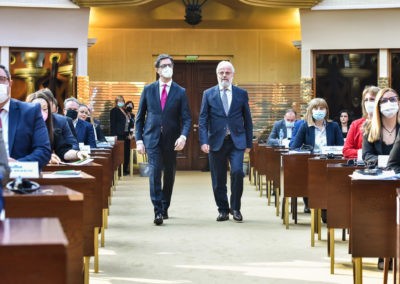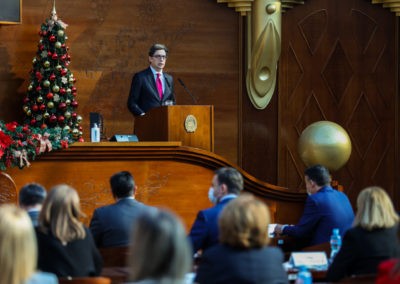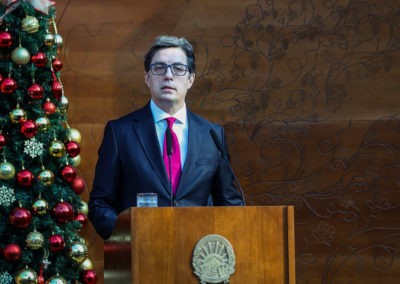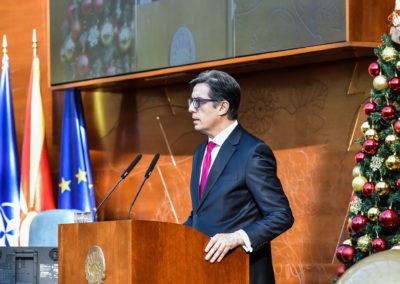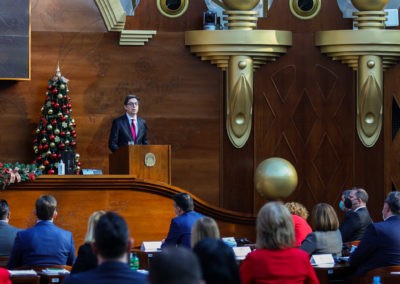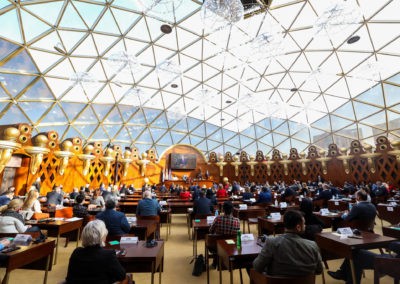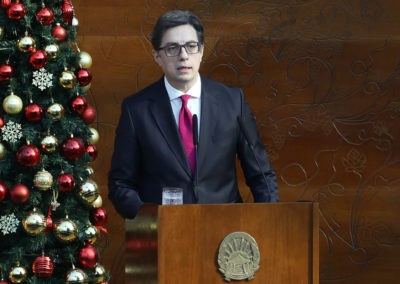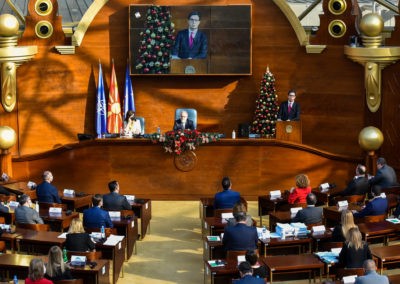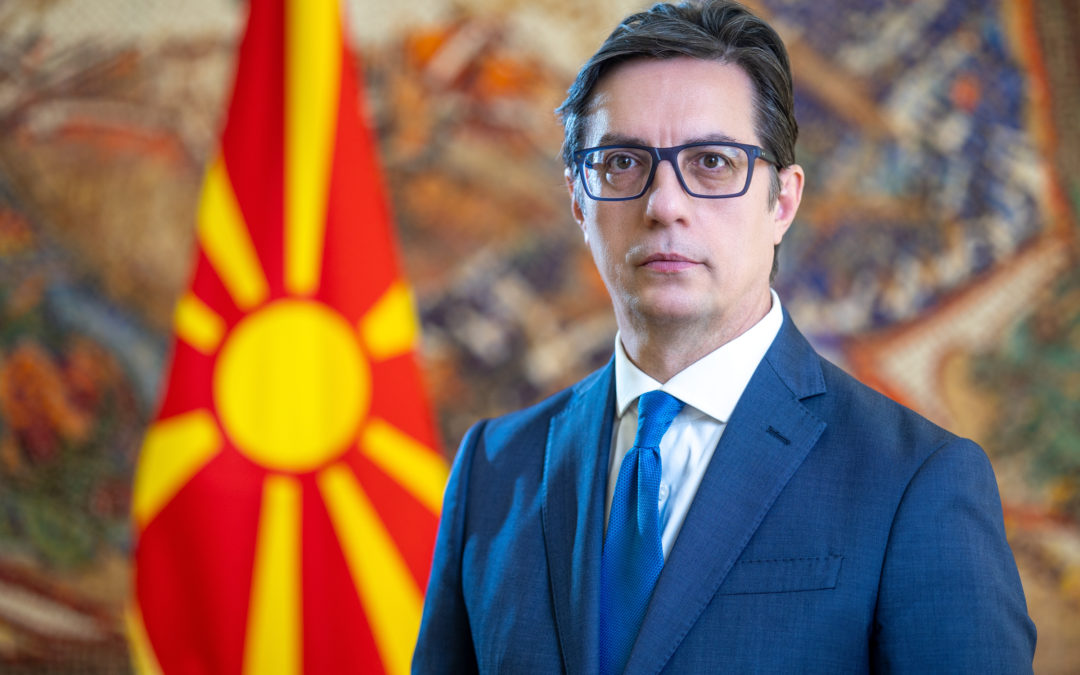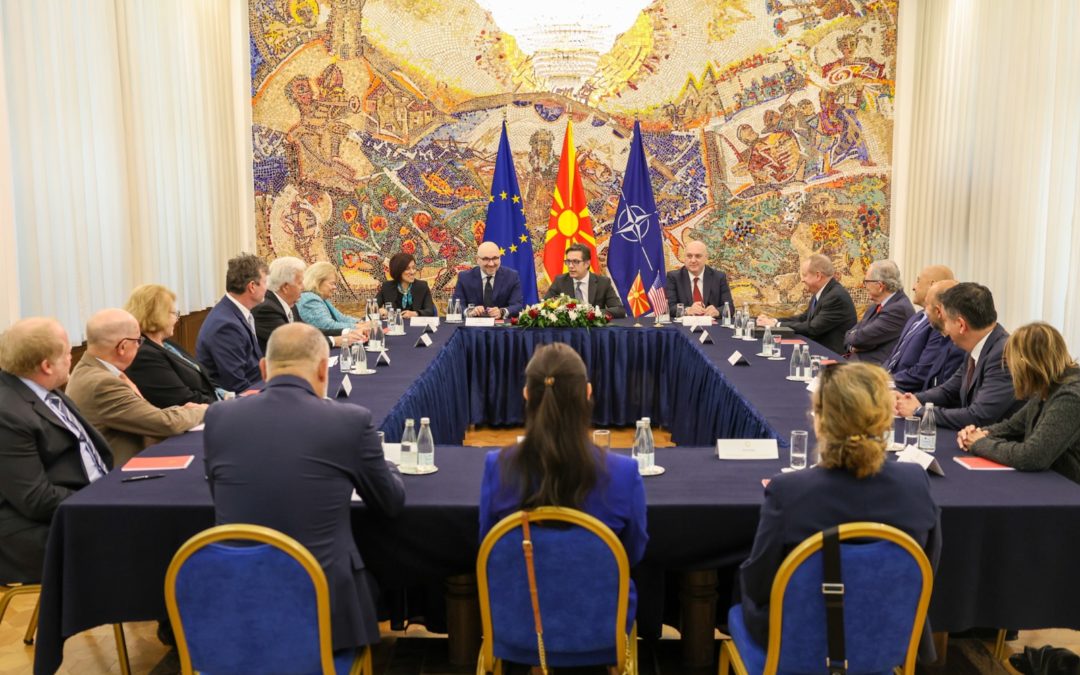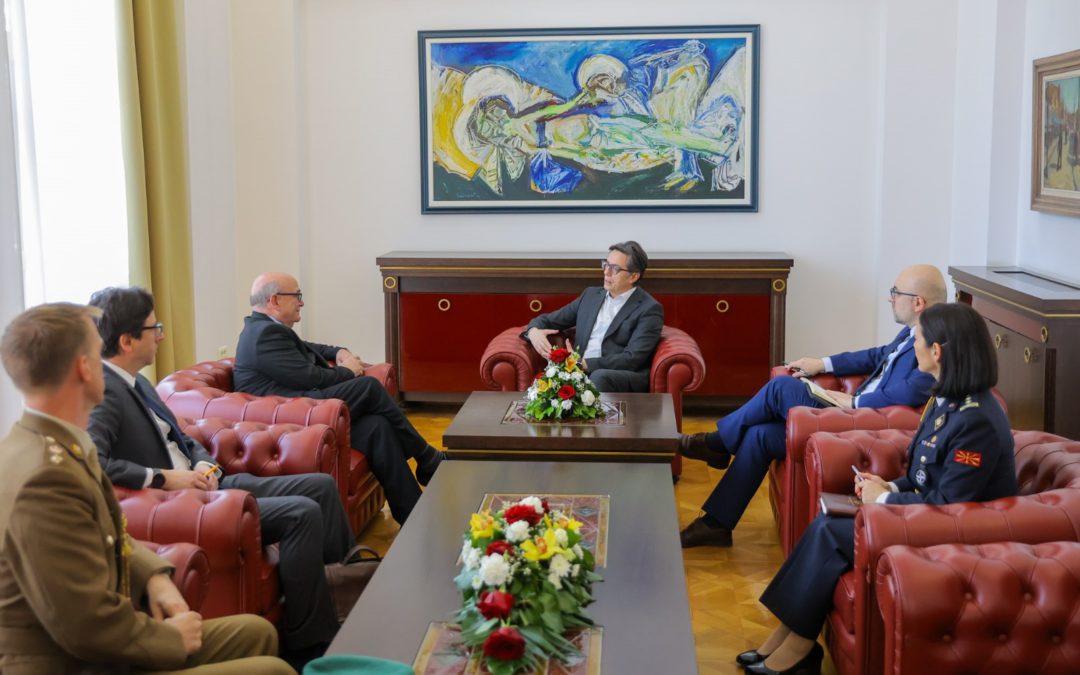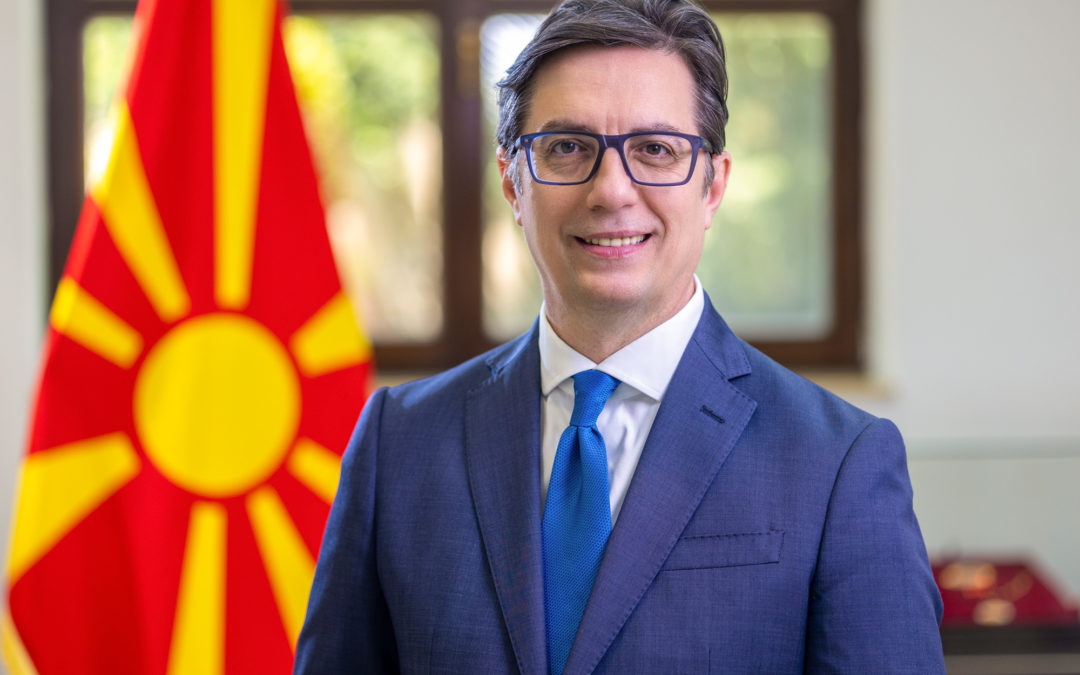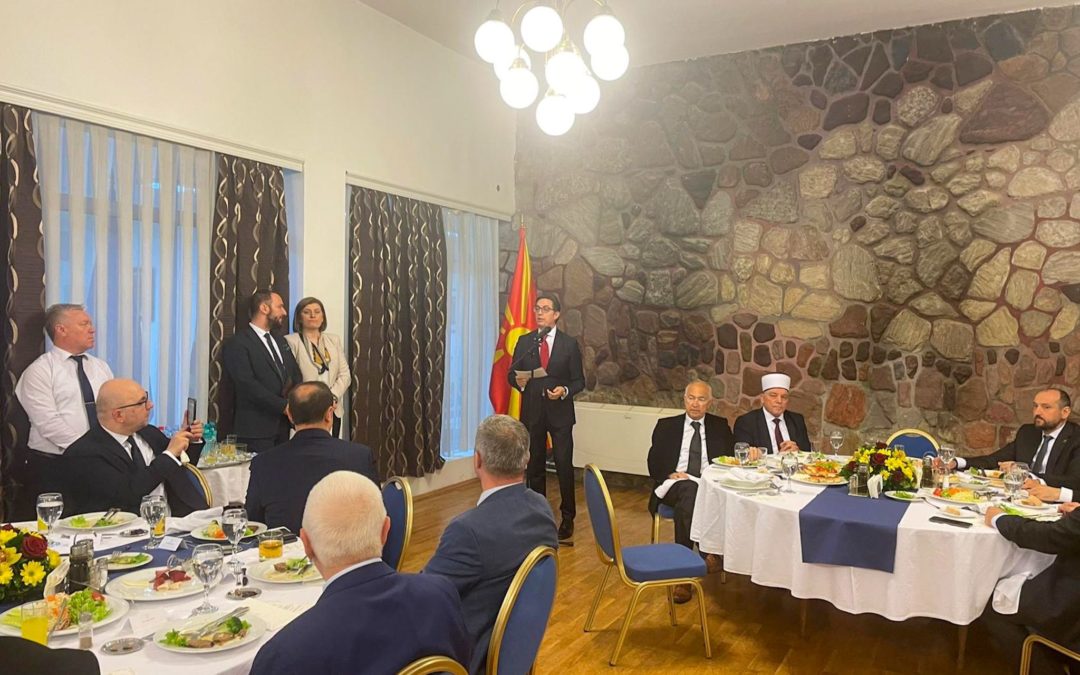Distinguished Citizens, Distinguished President of the Assembly,
Distinguished Prime Minister, Distinguished Members of Parliament,
Distinguished Ministers, Esteemed Guests,
Your Excellencies, Media Representatives,
Allow me, at the very beginning, to call you to pay one minute tribute to our fellow citizens who lost their lives in the bus accident in Bulgaria, in the fire at the modular hospital in Tetovo and to all those who died this year from Covid-19.
May they all rest in peace!
It is extremely difficult for me, for the second year in a row, to start my annual address to the Parliament by paying tribute to our citizens who are no longer with us. The series of terrible personal tragedies and collective traumas of the nation should finally awaken the conscience in the Macedonian society and the responsibility of the competent institutions, because there is nothing more valuable than human life, and nothing more unjust if the loss of that life is due to human factor, systemic failures or violated rules.
Ladies and Gentlemen,
Reform in the field of rule of law is by far the most important priority for the country and, in my opinion, will be and should be, in the years ahead, completely independent of our pace of approaching Brussels. Despite the moderate progress noted in the latest Report of the European Commission, our old obligation remains, which we often do not respect – to fully implement the reform in practice.
The most important aspect in building a functioning rule of law is equality before law, i.e. non-selectivity of justice. With the laws we pass we must not privilege those who do not respect the order as opposed to those who respect it. It is especially disappointing that, unfortunately, all relevant public opinion polls prove the growing sense among citizens that a culture of impunity prevails in the country. The only way to restore trust in the institutions is to have a legal finale in all the cases where there is a suspicion of crime. The big bus accident in which 45 of our citizens died is only the last in a series of such cases. If this one, as well as some previous cases, do not end up with a court decision within a reasonable time, the distrust of citizens will only grow. A society with such tendencies is fertile ground for the emergence of authoritarian and populist leaders who, instead of a quality process, promise “fast and efficient” justice.
Non-selectivity in the rule of law and responsibility are the best way to overcome the social apathy that is spreading, and the disappointment, especially among the younger ones who do not believe that there can ever be justice in this country. Many studies confirm that the emigration of our fellow citizens, to a large extent, is caused not only by existential reasons, but also by the quality of life. In other words, people go to those countries where there is justice, where even the richest and most powerful are held accountable for breaking the law, just like those who are pushed to the periphery of life.
Distinguished Members of Parliament,
A month ago, we signed a joint declaration with NATO, by which we formally completed the process of military integration in the Alliance. Although the health and energy crises are pushing for a different set of budget priorities, we must remain committed to investing in defense and security because they are the basis for the functioning of all other social sectors. I will mention only two examples from the last year when we were convinced that investing in defense means investing in dealing with difficult situations in completely different areas. We all witnessed the engagement of the Army during the biggest peaks of the pandemic when parts of the army units were engaged in support of health and other institutions in the country. Or, the sacrificial participation of the Army in dealing with the fires this summer.
NATO membership helps us cope better with both the old and the new security threats. Next major reform that is already underway in Western defense security and intelligence systems is to better deal with hybrid and cyber threats, and their most prominent aspect: disinformation.
The pandemic has shown how powerful disinformation can be on public opinion. Contrary to all exact statistics that prove that the assistance in medical equipment and vaccines from the European Union and on a bilateral basis from a dozen members of the Western Alliance is by far the largest, the general perception among the citizens is that the Western Balkans was forgotten by our allies. I believe our national interest is, as soon as possible, in a systematic way, to start promoting media literacy of citizens, especially young people in primary and secondary schools. Those digital generations are children of globalization, grown up on the Internet, and, in order not to become the first victims of disinformation, they need to be able to recognize them. Otherwise, self-proclaimed prophets on social media will win the battle with the world’s greatest minds and make many of our citizens believe in conspiracy theories instead of science and common sense.
Regarding the new security challenges, I would like to point out a potential danger faced by many countries, far more developed than us, both in economic and democratic terms. Namely, behind the curtain of the so-called large investments and infrastructure investments sometimes strategic motives for easier access to us and this part of the Balkans are hidden. As part of our current obligations as a NATO member, but also to comply with the European security policy, last year we signed a Memorandum of Understanding with the US Government that prevents installation of sensitive telecommunication equipment that can be externally misused for data collection of Macedonian citizens. In other words, the state is obliged to check all announcements of large foreign investments both from a security and strategic point of view, no matter how economically attractive they seem at first glance.
I have spoken about another related issue on other occasions as well, which has to be in our focus because is extremely important, namely, departization of institutions in the field of defense and security. We must keep politics far from the army and the services. The employees in these institutions, of course, like every citizen, have the right to their own personal political conviction, but when faced with the dilemma in their work: the party or the state, they must serve only the state, regardless of the political set of power. The members of the security services, who want to deal with both their professional work and politics, will have to decide on one or the other.
Ladies and Gentlemen,
After our path to the European Union was unfairly blocked, all of us, the whole nation, the politicians in power and in opposition, in the last 2 years, apart from being disappointed, have become obsessed with obtaining a green light to start negotiations in Brussels. The public is a witness that I am one of those who in the past decades has been consistent in the view that the Union is the best option for us and honestly, I cannot wait for the day when we will open, and even more so for the day when we close the membership negotiations. However, in the current context, knowing and publicly defending our red lines, we should not be preoccupied with how long it will take others to face the truth about us. Instead, we should be obsessed with key reforms at home on which the quality of life of our citizens depends.
Namely, from the beginning of the Bulgarian blockade until today, I am advocating for a careful and thoughtful approach in the negotiations, without sudden upheavals, because this is an issue of absolute highest national interest, and, when faced with a challenge of this caliber, rushing is not always the best ally. Our eastern neighbor has organized a series of elections over the past year, and regardless of the emotions provoked by the election environment, what is worrying is that we have heard rhetoric that goes beyond all previous claims related to our history, language and identity. One of those theses is that we are conducting systemic debulgarization which is a serious accusation which indeed has nothing to do with the reality. It is impossible for the ambassadors of 30 countries that have their own embassies in Skopje, 16 of which are European Union member states, who monitor the situation in our country on a daily basis, not to inform their capitals about such a process, which if so, would be tantamount to genocide.
Since recently, there is a new government and a president with a new mandate who are sending messages with different tones. I completely agree with some of them. Namely, to transfer the emphasis in our relations from the past to the present and instead of the ethnic feelings of the people from 10 centuries ago, to talk about the future, energy and infrastructure connection and, for example, Corridor 8, which has never become competitive to Corridor 10, of course, to the detriment of both Macedonian and Bulgarian national interests.
Regarding the blockade of European integration, I would like to refer to a thesis that we have been hearing lately, and that is that the prolonged status quo, allegedly, could cause security destabilization of the country. Today, in front of you, I want to make it clear that these are analyzes and predictions that are not grounded in reality and can only unnecessarily upset the citizens. We are a member of NATO, we directly border 3 members of the Alliance, and in the European Union, all members except one, believe that for the beginning of that process we have made more democratic reforms than any other candidate country at the moment when it was supposed to start negotiations.
We have no doubt that the European integration has no viable alternative for us, but it certainly has its price. If that price means giving up our identity, I do not see a politician here who would want to sell his people for such European integration. Recently, the Resolution adopted in this Assembly with an absolute consensus on the Macedonian state positions is indicative enough of that.
Let me repeat, our citizens can be calm, even if the blockade continues, we will not be threatened by any security destabilization regardless of the number of non-papers that some persistently deliver. Still, something else is possible. Experience after the NATO Summit in Bucharest in 2008 teaches us that democratic regression and forms of authoritarian and populist rule of an individual, group or party are possible. However, the responsibility for such a possible development of events will not lie with our citizens, but with us – the politicians. We must show that we have finally learnt the tragic lessons of our recent past when we were on the brink of a wider civil conflict.
Finally, the over-focus on negotiations with the EU has overshadowed what is essential in international relations, the processes of building good bilateral relations, above all, with countries that we share the same goals and values. Hence, in the coming period, it will be necessary with the new government to accelerate the filling in of vacant ambassadorial posts and with joint efforts to pay more attention to bilateral relations that cover much more aspects than just support for membership in the European Union.
Ladies and Gentlemen,
In my annual address to you, two years ago, from this place, I announced the project MKD2030, designed to set a strategic framework for development of the country in the next 10 years. Regrettably, due to the pandemic, as with many other projects, the work on this document was slowed down but, of course, not forgotten. To date, prominent individuals from the academic and business community, civil society, line ministries, parliament, chambers of commerce, trade unions, the government and the opposition have contributed to most of the active working groups. Although the world has been in quarantine in the past year, we hired a dozen prominent intellectuals from abroad and from our Diaspora, and I am sincerely thankful to everyone for their efforts.
They all had a complex task ahead of them, as NATO membership placed the country in a new geopolitical context, while at the same time the Western Balkans region slowly but surely began to emerge from the strategic perspectives of the great powers. The pandemic exposed to the public all the systemic weaknesses of the social infrastructure, as well as the areas in which investment is needed in preparation for the post-covid world.
The document shall contain an assessment of our strengths, but also weaknesses that require more investment and human capital, and a recommendation where to focus our efforts, with the ultimate goal, a better life for all. In addition, MKD2030 will emphasize several interdependent topics and areas, from digitization, decentralization and democratization, through environmental, economic, agricultural and health policies, to education and science and fight against mass emigration of young people.
In the middle of 2022, we will complete and publish the final document. I sincerely hope it will be translated into a National Development Strategy by the competent institutions, and in the coming years will be implemented by all future political governments, regardless of which political option they belong to. The ultimate goal is to create structured systems with deep foundations and internal potential to survive on their own, not to depend on those who are in charge of them.
Distinguished Members of Parliament, Distinguished Public,
The decades-long denials of our identity have made us turn more to the protection and promotion of national cultural heritage. However, in the transition, unfortunately, the vulgar neo-liberal concept of total commercialization prevailed in the sphere of culture, which, in essence stifled many creative actions of the mind.
It is high time we asked ourselves what we are doing against the culture of forgetfulness and carelessness that dominates, because not only judicial and bureaucratic reforms are important for Europe, but also our cultural investment. The European Union is made up of countries with a unique socio-cultural development; you are not accepted there as no man’s land, like a rootless tree. We have world reference works in that area and we must not be an exception to that rule, for ourselves, not for them. That is why much more care is needed for our language, for our pivotal cultural institutions, for our monuments, for the vital marks of our identity.
Ladies and Gentlemen,
Compared to previous decades, there has been relative economic progress in the Balkans, but also a significant democratic setback that only accelerates the emigration of people and increases their apathy. In most countries, autocratic and populist leaders are gaining increasing support from citizens, while at the same time the support for the European integration is declining. Due to decades of lagging behind in Europe, extra-regional players are filling the strategic vacuum with values that are not compatible with the Euro-Atlantic ones. We have seen the best evidence thereof in the past 18 months through the so-called Covid diplomacy.
Security suppresses integration rhetoric and agenda, identical as in the early 1990s, and, although it is clear that there is no potential for new wars, in the absence of political support and resources for such developments, it is clear that the policy of preferred stability and the status quo is experiencing a failure. It was finally recognized by the key players in the Western alliance – the United States, the European Union and the United Kingdom – who appointed special envoys to the Western Balkans, something that has never happened at the same time, not even in the 1990s.
Contrary to all estimates and expectations that the region is irreversibly placed on the western path, trends in recent years show a significant decline in support for European integration. We are not exception to those trends, we are, unfortunately, record holders in the region according to the decline in support which in relevant research is over 20% in just 2 years and it goes clearly along the line of ethnicity of the people, which must be a serious cause for concern in a multiethnic political community such as ours.
Although the motives for such a change of mood are clear, namely, no European nation has been exposed to such irrational demands as the Macedonian in its attempts for international affirmation, we should know that we are entering a year in which not only we but all countries in the western Balkans will again face the old dilemmas. Despite the fact that the prosperity of the countries of the same region is interdependent, our future largely depends on the decisions we make here, in our national institutions. A critical precondition for a real decision is to carefully monitor what is happening around us and in the international centers of power and to react reasonably and in a timely manner.
The first possibility before us is: exhausted by the long transition and the obvious injustices towards us as a nation, to believe that nationalists and populists know more than anyone else and have instant solutions to key problems, even though it is known that nowhere in the world have they contributed to the happiness of the people and the prosperity of the nations. The second possibility is to support the work of modest, reasonable and non-corrupt individuals at national and local level, who know how to unite the potential of citizens and who prefer their virtues, knowledge and human integrity, not only their party affiliation and ethnicity.
We have spent 2 months on local elections, even more time on party combinations and calculations for a new parliamentary majority. I expect the new government to immediately start dealing with the real problems of the citizens that have multiplied this year, from the pandemic and the economy to the energy crisis, which is yet to deepen.
Ladies and Gentlemen,
Although it does not fall within my competence, allow me to comment very briefly on the withdrawal of the current Prime Minister Zoran Zaev from politics, with whom we have been fighting battles in the broad civil movement for human rights and freedoms for the past ten years. Regardless of the individual views of the citizens on the policies of the outgoing Prime Minister, the public knows of several disagreements among us on some issues, but it is indisputably an act that should be welcomed because it does not happen often in new democracies. The fact is that he is stepping down when his party is in power, and this is a diametrically opposite situation from 2017, when we could not carry out a peaceful transition of power with the formed parliamentary majority, which directly provoked the events of April 27, the biggest shame for Macedonian democracy in history.
Like it or not, politics is part of our lives, but it must never become our whole life. When man finds the meaning of his existence only in political power and rule over others, when coming and staying in power is the only cause in man’s life, it opens the door wide to conflicts and divisions among people. A few remained to live in our homeland, we are divided on many grounds, and new divisions are the last thing we can afford.
In 2022, I wish good health to you and your loved ones! May we finally leave behind the talks about vaccines, masks, quarantines, isolation! The old wisdom says that if we are healthy, we will find solutions to all problems in life, but still, my message to all our citizens and all politicians, in the year ahead, is to try at least to respect each other a bit more. From all the catastrophes we have witnessed in the last 2 years, we have learnt, unfortunately, in the most difficult way, that if we lose our closest ones, neither wealth, nor houses, money, power are worth.
May you all be alive and healthy and may our common state – the Republic of North Macedonia – be eternal!
Thank you!
